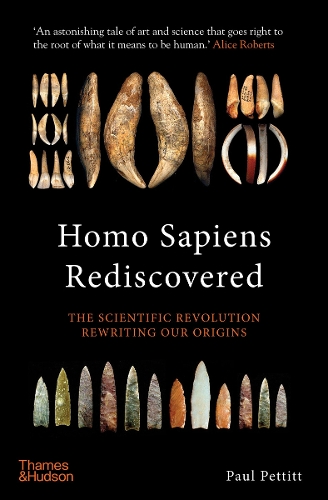
Homo Sapiens Rediscovered: The Scientific Revolution Rewriting Our Origins
(Hardback)
Publishing Details
Homo Sapiens Rediscovered: The Scientific Revolution Rewriting Our Origins
By (Author) Paul Pettitt
Thames & Hudson Ltd
Thames & Hudson Ltd
15th November 2022
15th November 2022
United Kingdom
Classifications
General
Non Fiction
Popular science
599.938
Physical Properties
Hardback
320
Width 153mm, Height 234mm
680g
Description
An expert palaeoarchaeologist reveals how our understanding of the evolution of our species has been transformed by momentous discoveries and technological advancements.
Who are we How do scientists define Homo sapiens, and how does our species differ from the extinct hominins that came before us This illuminating book explores how the latest scientific advances, especially in genetics, are revolutionizing our understanding of human evolution. Paul Pettitt reveals the extraordinary story of how our ancestors adapted to unforgiving and relentlessly changing climates, leading to remarkable innovations in art, technology and society that we are only now beginning to comprehend.
Drawing on twenty-five years of experience in the field, Paul Pettitt immerses readers in the caves and rockshelters that provide evidence of our African origins, dispersals to the far reaches of Eurasia, Australasia and ultimately the Americas. Popular accounts of the evolution of Homo sapiens emphasize biomolecular research, notably genetics, but this book also draws from the wealth of information from specific excavations and artefacts, including the author's own investigations into the origins of art and how it evolved over its first 25,000 years. He focuses in particular on behaviour, using archaeological evidence to bring an intimate perspective on lives as they were lived in the almost unimaginably distant past.
Reviews
'An astonishing tale of art and science that goes right to the root of what it means to be human' - Alice Roberts
'The scope and detail here is sweeping, carrying the reader through tens of thousands of years. By grace of Pettitts long experience in the field and thorough immersion in the world of the Palaeolithic, there are a few stunning moments where even the most astonishing archaeology seems tangible' - Current Archaeology
'An excellent book, written with Paul's signature knowledge and enthusiasm. It should be required reading for everyone interested in our origins' - Clive Gamble
'Drawing on his many years of experience with Palaeolithic archaeology, Paul Pettitts expert account of our origins introduces the reader to the methods used to find out about the remote past and the complexities involved in interpretating this data. What comes across is a powerful message: when looking around you in awe of humanitys cultural and technological achievements, bear in mind that, as the old saying goes, we stand on the shoulders of Ice Age giants' - Joo Zilho, ICREA Research Professor, University of Barcelona
'Powerful a vivid view of where we have come from and what makes us who we are' - New Scientist
'Pettitt successfully maintain[s] a convivial over a cup of coffee tone that weights into genetics then swiftly yanks thing back to a depth a wider audience will find absorbing. Much has changed, but as Pettitt shows, many things remain constant we owe our distant ancestors a debt of gratitude or the hard yards they put in' - Geographical
'Grand narratives about the human past are tricky to pull off. Pettitt presents the complex and fascinating story of how our species came to be, in a readable series of personal stories combined with detailed explanations and illustrations of the archaeological and human fossil record' - British Archaeology
'Pettitt's easy-going narrative style of writing makes his book highly engaging and eminently readable. A notably accessible work that does not sacrifice accuracy or succumb to oversimplicity' - American Journal of Biological Anthropology
Author Bio
Paul Pettitt is Professor of Palaeolithic Archaeology at Durham University, specializing in the European Middle and Upper Palaeolithic. His research interests focus particularly on the origins of art and the development of treatment of the dead, and he has conducted fieldwork across Europe and further afield.
